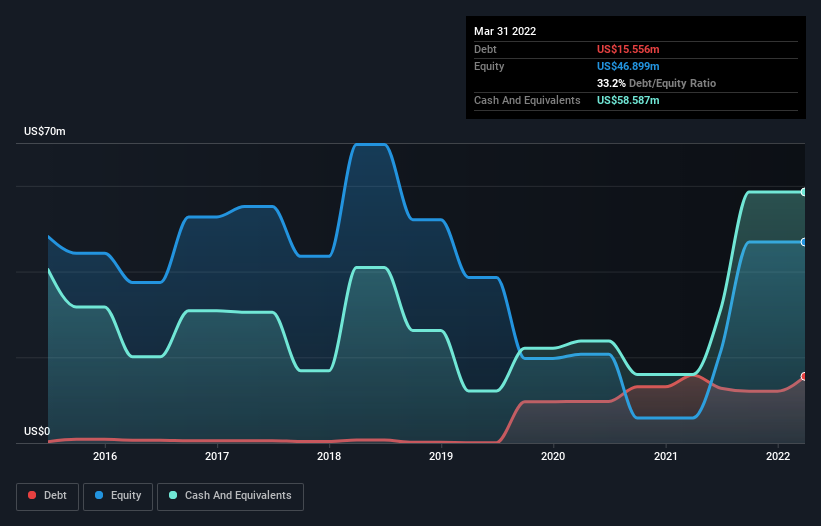
Legendary fund manager Li Lu (who Charlie Munger backed) once said, 'The biggest investment risk is not the volatility of prices, but whether you will suffer a permanent loss of capital.' So it seems the smart money knows that debt - which is usually involved in bankruptcies - is a very important factor, when you assess how risky a company is. As with many other companies MDxHealth SA (EBR:MDXH) makes use of debt. But the more important question is: how much risk is that debt creating?
Why Does Debt Bring Risk?
Debt is a tool to help businesses grow, but if a business is incapable of paying off its lenders, then it exists at their mercy. In the worst case scenario, a company can go bankrupt if it cannot pay its creditors. However, a more common (but still painful) scenario is that it has to raise new equity capital at a low price, thus permanently diluting shareholders. Of course, plenty of companies use debt to fund growth, without any negative consequences. When we think about a company's use of debt, we first look at cash and debt together.
Check out our latest analysis for MDxHealth
How Much Debt Does MDxHealth Carry?
As you can see below, MDxHealth had US$15.6m of debt, at December 2021, which is about the same as the year before. You can click the chart for greater detail. However, it does have US$58.6m in cash offsetting this, leading to net cash of US$43.0m.

How Strong Is MDxHealth's Balance Sheet?
According to the last reported balance sheet, MDxHealth had liabilities of US$16.4m due within 12 months, and liabilities of US$11.7m due beyond 12 months. Offsetting these obligations, it had cash of US$58.6m as well as receivables valued at US$5.06m due within 12 months. So it can boast US$35.5m more liquid assets than total liabilities.
It's good to see that MDxHealth has plenty of liquidity on its balance sheet, suggesting conservative management of liabilities. Because it has plenty of assets, it is unlikely to have trouble with its lenders. Succinctly put, MDxHealth boasts net cash, so it's fair to say it does not have a heavy debt load! There's no doubt that we learn most about debt from the balance sheet. But ultimately the future profitability of the business will decide if MDxHealth can strengthen its balance sheet over time. So if you're focused on the future you can check out this free report showing analyst profit forecasts.
Over 12 months, MDxHealth reported revenue of US$23m, which is a gain of 25%, although it did not report any earnings before interest and tax. With any luck the company will be able to grow its way to profitability.
So How Risky Is MDxHealth?
Statistically speaking companies that lose money are riskier than those that make money. And the fact is that over the last twelve months MDxHealth lost money at the earnings before interest and tax (EBIT) line. Indeed, in that time it burnt through US$23m of cash and made a loss of US$31m. Given it only has net cash of US$43.0m, the company may need to raise more capital if it doesn't reach break-even soon. With very solid revenue growth in the last year, MDxHealth may be on a path to profitability. By investing before those profits, shareholders take on more risk in the hope of bigger rewards. There's no doubt that we learn most about debt from the balance sheet. However, not all investment risk resides within the balance sheet - far from it. For instance, we've identified 2 warning signs for MDxHealth that you should be aware of.
At the end of the day, it's often better to focus on companies that are free from net debt. You can access our special list of such companies (all with a track record of profit growth). It's free.
New: Manage All Your Stock Portfolios in One Place
We've created the ultimate portfolio companion for stock investors, and it's free.
• Connect an unlimited number of Portfolios and see your total in one currency
• Be alerted to new Warning Signs or Risks via email or mobile
• Track the Fair Value of your stocks
Have feedback on this article? Concerned about the content? Get in touch with us directly. Alternatively, email editorial-team (at) simplywallst.com.
This article by Simply Wall St is general in nature. We provide commentary based on historical data and analyst forecasts only using an unbiased methodology and our articles are not intended to be financial advice. It does not constitute a recommendation to buy or sell any stock, and does not take account of your objectives, or your financial situation. We aim to bring you long-term focused analysis driven by fundamental data. Note that our analysis may not factor in the latest price-sensitive company announcements or qualitative material. Simply Wall St has no position in any stocks mentioned.
About ENXTBR:MDXH
MDxHealth
A commercial-stage precision diagnostics company, provides urologic solutions in the United States, Europe, and internationally.
Adequate balance sheet and fair value.
Similar Companies
Market Insights
Community Narratives




